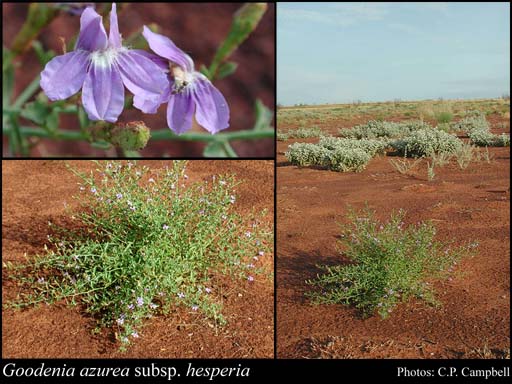- Reference
- Nuytsia 16(1):171, Fig. 1B (2006)
- Conservation Code
- Not threatened
- Naturalised Status
- Native to Western Australia
- Name Status
- Current
Dense spreading or sprawling, erect, multi-stemmed perennial, herb (or subshrub), to 1 m high. Fl. blue-purple, Jan to Dec (seasonal rainfall). Sand, ironstone gravel, laterite. Plains, dune swales.

Scientific Description
Stems ribbed. Leaves flat, 20-50 mm long, 3-10 mm wide, Indumentum absent (leaves glabrous); margins entire. Bracteoles present, 3-4 mm long, glabrous. Pedicel pedicellate, Pedicel length the pedicels 7-9 mm long, glabrous. Calyx lobes present, Calyx length 3-4 mm long, hairy, glandular hairs. Corolla blue or purple, 18-25 mm long, without auricles, not spurred, hairy on the outside, glandular hairs, hairy on the inside; central lobes 6-7 mm long, with wings; outer lobes 12-17 mm long, wings present on both sides, 1.5-2.2 mm wide. Anthers free. Ovary inferior, not gibbose; style 11.5-12.5 mm long, hairy; indusium single, hairy; ovules more than two. Flowers in April, May, June, July, August, September and October. Occurs in the Pilbara (PIL), Great Victoria Desert (GVD), Central Ranges (CR), Gibson Desert (GD), Great Sandy Desert (GSD), Little Sandy Desert(LSD), Dampier land (DL) and Ord-Victoria Plains (OVP) IBRA Region(s), of the Northern (N) and Eremaean (E) Botanical Province.
Distribution
- IBRA Regions
- Central Ranges, Dampierland, Gascoyne, Gibson Desert, Great Sandy Desert, Great Victoria Desert, Little Sandy Desert, Ord Victoria Plain, Pilbara.
- IBRA Subregions
- Carnegie, Central, Chichester, Hamersley, Lateritic Plain, Mackay, Mann-Musgrave Block, McLarty, Pindanland, Rudall, South Kimberley Interzone, Trainor.
- Local Government Areas (LGAs)
- Broome, Derby-West Kimberley, East Pilbara, Halls Creek, Laverton, Ngaanyatjarraku, Wiluna.